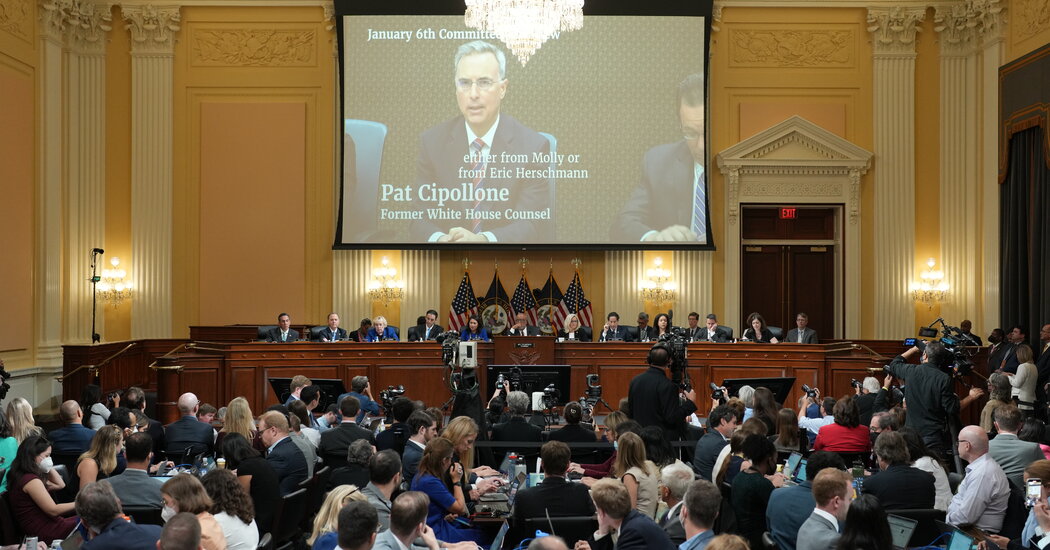
WASHINGTON — The House committee investigating the Jan. 6 attack on the Capitol is planning to return to prime time on Thursday for what could be the finale of its summer hearing schedule: a session focused on former President Donald J. Trump’s 187 minutes of inaction as a mob of his supporters assaulted Congress.
The hearing, scheduled for 8 p.m. on July 21, is expected to give a detailed account of how Mr. Trump resisted multiple entreaties from staffers, lawyers and even his own family to call off the attack, which raged for hours in the early afternoon of Jan. 6, 2021.
Representatives Elaine Luria, Democrat of Virginia, and Adam Kinzinger, Republican of Illinois, are expected to play leading roles in the hearing.
One witness the panel could hear from is Sarah Matthews, a former White House press aide who resigned in the aftermath of Jan. 6. She has told the committee that a tweet Mr. Trump sent attacking Vice President Mike Pence while the riot was underway was like “pouring gasoline on the fire.”
Mr. Trump had tried unsuccessfully to pressure Mr. Pence to reject Congress’s official count of electoral votes to confirm Joseph R. Biden Jr. as the president-elect and was inside the Capitol as rioters breached the building chanting “hang Mike Pence.”
The committee is also likely to play clips of the testimony of other witnesses who attempted to intervene with Mr. Trump during those more than three hours, including Pat A. Cipollone, the White House counsel. The committee has also said it received testimony from Keith Kellogg, a retired lieutenant general who was Mr. Pence’s national security adviser, about Mr. Trump’s refusal to condemn the violence as the mob engulfed the Capitol.
Mr. Kellogg said Ivanka Trump, Mr. Trump’s eldest daughter, urged her father at least twice to call off the violence, as did Mark Meadows, the chief of staff, and Kayleigh McEnany, the White House press secretary.
The panel has already heard testimony from witnesses about unsuccessful attempts to get Mr. Trump to call for peace.
Most memorably, the former White House aide Cassidy Hutchinson described to the committee how Mr. Trump sided with the mob and sympathized with their chants for the execution of Mr. Pence.
The hearing was initially planned to be the last in a series of summer sessions in which the panel would reveal its findings. But the committee has continued to collect new evidence, and lawmakers have hinted that they could add more hearings to the schedule.
Key Revelations From the Jan. 6 Hearings
Among the new wrinkles, the committee is looking into the disappearance of Secret Service text messages from around the time of the attack.
The committee issued a subpoena to the Secret Service on Friday evening, seeking text messages from Jan. 5 and 6, 2021, that were reportedly erased as well as any after-action reports.
The development came after the inspector general for the Department of Homeland Security, the parent agency of the Secret Service, met with the panel on Friday and told lawmakers that many of the texts were erased as part of a device replacement program even after the inspector general had requested them as part of his inquiry into the events of Jan. 6.
The Secret Service has disputed parts of the inspector general’s findings, saying that data on some phones had been “lost” as part of a planned three-month “system migration” in January 2021, but none pertinent to the inquiry.
The agency said that the project was underway before it received notice from the inspector general to preserve its data and that it did not “maliciously” delete text messages.
Representative Jamie Raskin, Democrat of Maryland and a member of the committee, said the panel wants to hear more from the Secret Service to try to get to understand what happened.
“The committee is absolutely determined to get to the bottom of this and to find all of the missing texts,” Mr. Raskin told reporters on Capitol Hill. “They are missing, but in the age of high technology, we should not give up.”
On Friday, the committee also interviewed Patrick Byrne, the former CEO of Overstock.com, who financed some of the legal efforts to overturn the 2020 election.
Mr. Byrne was present at what was perhaps the most dramatic meeting of the Trump presidency on Dec. 18, 2020, in which Michael T. Flynn, the former national security adviser, and Sidney Powell, the pro-Trump lawyer, pressed to seize voting machines and name Ms. Powell as a special counsel to work to overturn the election.
Representative Bennie Thompson, Democrat of Mississippi and the Jan. 6 committee chairman, said the panel also has been discussing what to do about some more high-profile potential witnesses.
Virginia Thomas, a political activist who pushed to overturn the 2020 election and the wife of Supreme Court Justice Clarence Thomas, is “still on the committee’s list” of witnesses to call, even though she has rebuffed attempts to interview her, Mr. Thompson said.
Mr. Thompson also told reporters the panel was continuing to discuss — as members have for months — whether it should try to summon Mr. Trump and Mr. Pence to testify, but lawmakers have not reached a conclusion about how to proceed.
The panel believes both men would probably fight attempts to get them to testify, and some lawmakers worry a public battle over Mr. Trump’s compliance would distract from the actual work of fact finding.
Mr. Thompson has previously said the committee had ruled out a subpoena for Mr. Pence, citing “significant information” it had received from two of his aides, Marc Short and Greg Jacob.




